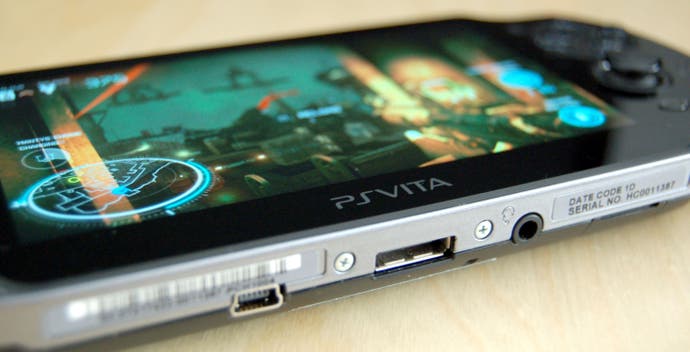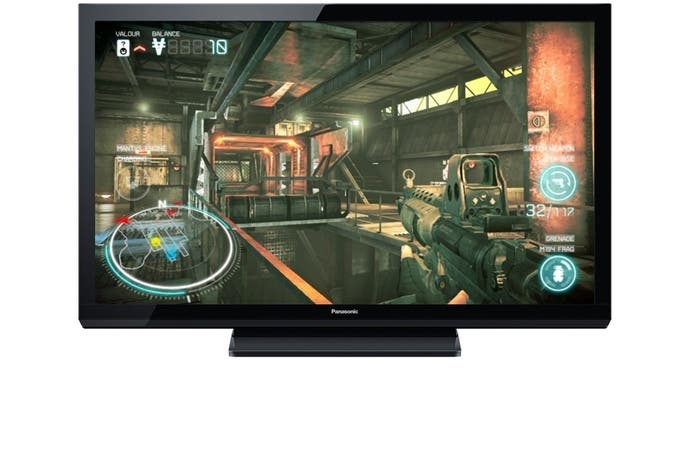PlayStation Vita video output mod review
Digital Foundry on the direct feed upgrade that lets you live-stream and capture gameplay on Sony's handheld.
If there's one glaring omission from the design of the PlayStation Vita, it's provision for a video output. While the notion of running games designed for a handheld on an HDTV may not appeal to many, the ability to capture footage or live-stream Vita gameplay is a highly attractive option to YouTube fans, bloggers and games journalists alike, so it was with much interest that we noted the arrival of a new product that adds video output to any Vita, with the option to buy a pre-modified, brand new handheld.
Available from Japanese site 3DSvideocapture.com (yes, they'll also mod Nintendo's handheld too), the upgrade isn't cheap - we're talking total costs in the region of £200, not including the handheld itself. Alternatively you can spend around £300 in total if you buy a brand-new unit direct from the site (though beware custom fees).
It's clearly quite an investment then, and it's worth pointing out that it's not the most flexible solution either. In common with previous 3DS video-out mods, image data is piped out of the Vita via USB rather than HDMI (in contrast to the custom hardware we used for our Stranger's Wrath, Need for Speed: Most Wanted and Assassin's Creed features), so if you did simply want to connect your handheld to your HDTV, you'd need to channel the signal through a PC - not exactly ideal.
However, it is the only video-out solution available to potential Vita broadcasters, so we put the whole purchase procedure to the test, ordering the upgrade from the website, paying via PayPal, shipping the unit to Japan (via Royal Mail's "International Signed For" service - about £12) and then sitting back, hoping that our beloved handheld wouldn't get lost in the post. After about ten days, we received a DHL shipping notification that our Vita was on the way back to the UK, with the package arriving three days later. Opening up the box, we found our unit returned in excellent condition, with the handheld now sporting a small USB port on the base of the unit, to the left of the charging port and beneath the product barcode.
"The mod is clearly geared towards video capture on PC - the USB connection ensures there's no way to directly interface the Vita to an HDTV for example."

A very poorly translated instruction manual clued us in on where to download the driver and viewer software. Once a product key is input (the key is tied to a serial number on the USB board implanted in your Vita), you're away. First impressions aren't particularly promising, but only because the software defaults to an interlaced 960x544 resolution, effectively murdering the image quality. The viewer software itself - at the moment at least - only supports Japanese, but it was easy enough to find the resolution settings, where 960x544 progressive is a valid selectable and offers up the kind of boost to image quality that you'd expect. The software has a vast array of options and for the non-Japanese speaker it can be bewildering, so we've provided accurate English translations of the options below.
Returning to the modification itself, the viewer software reports that the USB connection is streaming anything from 296-304mbps - that's 37-38MB/s. Assuming there's no compression involved here, what we're looking at is a device that is pushing USB 2.0 bandwidth to its absolute, practical limit - so you should expect variable results on different hardware. At the top of the viewer, frame-rate throughput is measured and we found that on one PC, there would be occasional dips to 50fps before full refresh was restored (a 30fps limiter is available to iron out problems like this). The same PC simply would not work with the modified Vita when we tried its USB 3.0 ports. Moving to an older laptop, performance was improved - effectively a locked 60fps, with just the occasional, singular dropped frame. Our last test was based on our Core i7 3770K graphics card test platform, with the Vita connected to a USB 3.0 port. Here we achieved the desired locked 60fps throughput with no problem whatsoever. Mileage clearly will vary.
Streaming 960x544 at 60 frames per second over USB 2.0 is quite an achievement, especially as it seems that there's no MPEG-style compression in effect here. We can see how it is achieved in part by noting that the colour-space is notably downgraded. The Vita's internal 24-bit RGB is converted to digital component YUV 4:1:1, which reduces the raw bandwidth required by 50 per cent (additional compression would still be needed to hit 38MB/s however). What this means is that chroma resolution - most notable in hard reds, blues and greens - is significantly pared back, resulting in some blockiness. The presentation looks very good overall, and for YouTube videos, it still does the job nicely.
"It's clearly early days for the mod - it streams video just fine to the PC viewer software, but you'll need to use FRAPS to actually capture the image."
At the moment, it's fair to say that the modification does the job as intended, but it could do with further refinement. For example, for a product aimed at capture, it's surprising that there are no actual recording options in the viewer - you'll need FRAPS or something similar in order to acquire the image on-screen. There's also no audio support - the headphone jack on the Vita is attached to the PC's sound card to fill the void here, which highlights another issue: there's clearly a noticeable amount of latency (anything up to 100ms by our estimate) in the on-screen image.
What this all boils down to is that this is a modification aimed at a very specific audience. For those looking to run Vita gameplay on a larger screen, the product isn't really flexible or responsive enough. And to be honest, based on many hours of play with our older Vita captures, we cannot stress highly enough how fundamental the handheld's brilliant screen is to the core experience. The size of the display effectively hides many of the compromises developers need to make in taking their existing games onto a mobile platform - elements like lower resolution textures are far less noticeable on a 5-inch screen compared to any kind of full-size equivalent. The same rule applies for Vita titles that are not running at native resolution - it's noticeable on the handheld's screen, but it's not especially annoying - but scaled up your HDTV, the hit to the presentation is palpable. The other key takeaway from the Vita capture experience is just how good the OLED panel actually is - the rich, vibrant colours are simply beautiful and it's telling that most desktop displays can't match the sheer quality of its image.
However, for all its limitations, in theory this modification could be a shot in the arm for the Vita platform on a more general level. Despite the arrival of more powerful tablet hardware, the point is that Sony's handheld still plays host to the most technologically ambitious mobile games on the market. Unfortunately, up until now, the only way you could see those titles in motion was from selectively edited trailers or from shaky YouTube wobbly-cam footage. Now the games can be showcased by anyone - enthusiast or pro - willing to make the investment in the hardware, and that can only be a good thing.











